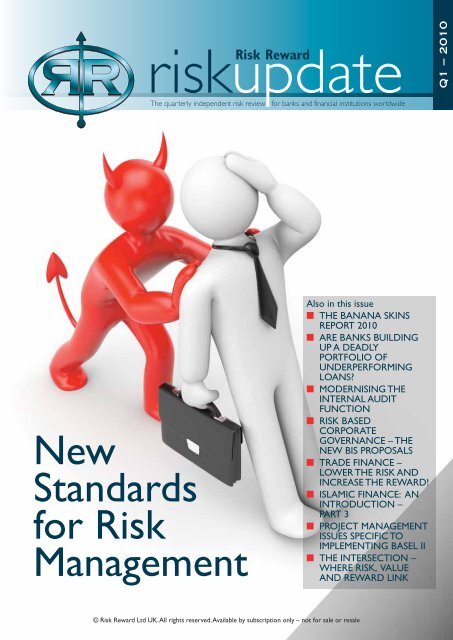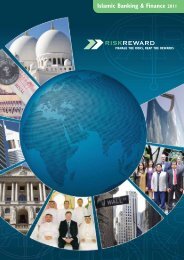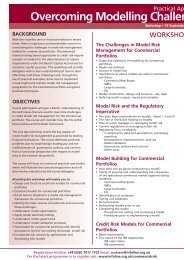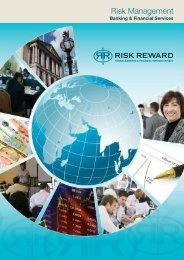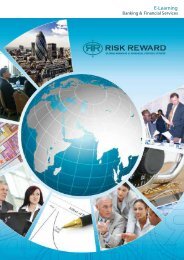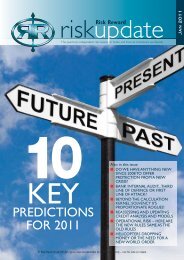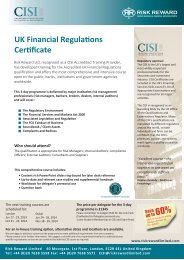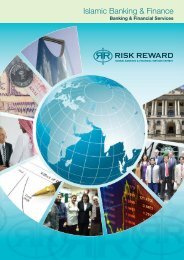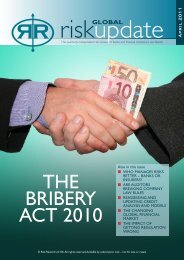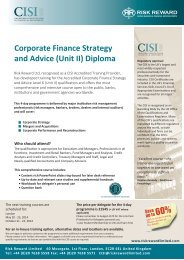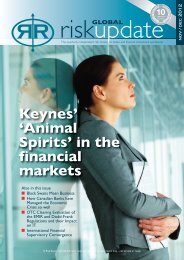Islamic Finance â an Introduction â Part III - Risk Reward Limited
Islamic Finance â an Introduction â Part III - Risk Reward Limited
Islamic Finance â an Introduction â Part III - Risk Reward Limited
Create successful ePaper yourself
Turn your PDF publications into a flip-book with our unique Google optimized e-Paper software.
iskupdate<br />
<strong>Risk</strong> <strong>Reward</strong><br />
Q1 – 2010<br />
The quarterly independent risk review for b<strong>an</strong>ks <strong>an</strong>d fin<strong>an</strong>cial institutions worldwide<br />
New<br />
St<strong>an</strong>dards<br />
for <strong>Risk</strong><br />
M<strong>an</strong>agement<br />
Also in this issue<br />
■ THE BANANA SKINS<br />
REPORT 2010<br />
■ ARE BANKS BUILDING<br />
UP A DEADLY<br />
PORTFOLIO OF<br />
UNDERPERFORMING<br />
LOANS<br />
■ MODERNISING THE<br />
INTERNAL AUDIT<br />
FUNCTION<br />
■ RISK BASED<br />
CORPORATE<br />
GOVERNANCE – THE<br />
NEW BIS PROPOSALS<br />
■ TRADE FINANCE –<br />
LOWER THE RISK AND<br />
INCREASE THE REWARD!<br />
■ ISLAMIC FINANCE: AN<br />
INTRODUCTION –<br />
PART 3<br />
■ PROJECT MANAGEMENT<br />
ISSUES SPECIFIC TO<br />
IMPLEMENTING BASEL II<br />
■ THE INTERSECTION –<br />
WHERE RISK, VALUE<br />
AND REWARD LINK<br />
© <strong>Risk</strong> <strong>Reward</strong> Ltd UK. All rights reserved. Available by subscription only – not for sale or resale
<strong>Risk</strong> Update 2010 – Q1<br />
ISLAMIC FINANCE –<br />
AN INTRODUCTION<br />
– PART <strong>III</strong><br />
Mark Andrews ACISI IFQ, is <strong>Risk</strong> <strong>Reward</strong> ‘s Director of <strong>Islamic</strong> B<strong>an</strong>king <strong>an</strong>d<br />
<strong>Fin<strong>an</strong>ce</strong>. He has been <strong>an</strong> investment <strong>an</strong>d retail b<strong>an</strong>ker for over 25 years<br />
<strong>an</strong>d a qualified specialist in <strong>Islamic</strong> b<strong>an</strong>king <strong>an</strong>d fin<strong>an</strong>ce. Since 2007 Mark<br />
has worked in most countries in the Gulf <strong>an</strong>d Egypt advising on <strong>Islamic</strong><br />
b<strong>an</strong>king products <strong>an</strong>d risk. In this third article in a series he considers how<br />
<strong>an</strong> <strong>Islamic</strong> B<strong>an</strong>k “adv<strong>an</strong>ces” its funds, or in old fashioned b<strong>an</strong>king terms, how<br />
it “makes its money”.<br />
INVESTMENTS<br />
Whilst the terms “lo<strong>an</strong>” or “lending” are commonly used, even<br />
by <strong>Islamic</strong> b<strong>an</strong>ks, they are not strictly correct in <strong>an</strong> <strong>Islamic</strong><br />
context because <strong>an</strong> <strong>Islamic</strong> b<strong>an</strong>k is engaged in mutual trading<br />
both with <strong>an</strong>d alongside its clients on both sides of the bal<strong>an</strong>ce<br />
sheet. An <strong>Islamic</strong> b<strong>an</strong>k has a direct interest in the outcome of<br />
all these trading tr<strong>an</strong>sactions, sharing both profits <strong>an</strong>d losses<br />
with its partners/clients. Unlike a conventional b<strong>an</strong>k where<br />
depositors are creditors <strong>an</strong>d borrowers are debtors <strong>an</strong>d there is<br />
almost no mutuality at all, <strong>an</strong> <strong>Islamic</strong> b<strong>an</strong>k has partners,<br />
investors, principals <strong>an</strong>d agents at every level.<br />
So <strong>an</strong> <strong>Islamic</strong> b<strong>an</strong>k does not “lend”, it “invests”!<br />
So how does <strong>an</strong> <strong>Islamic</strong> “invest” its funds The <strong>an</strong>swer is “very<br />
carefully” <strong>an</strong>d for this reason only a h<strong>an</strong>dful of the <strong>Islamic</strong><br />
products available are actually used in practice. This has caused<br />
<strong>Islamic</strong> b<strong>an</strong>ks – on the investment side at least – to become<br />
rather narrow specialists, dealing mainly in two products; split<br />
between Murabaha (akin to a lo<strong>an</strong>) <strong>an</strong>d Ijara (akin to leasing<br />
operations). Most <strong>Islamic</strong> b<strong>an</strong>ks will advertise a wide r<strong>an</strong>ge of<br />
<strong>Islamic</strong> investment products, including mortgage<br />
funding but most – in fact nearly all - have the lion’s<br />
share of their investments in either Ijara or<br />
Murabaha form. Why is that<br />
<strong>Islamic</strong> b<strong>an</strong>k. During the author’s informal discussions with<br />
<strong>Islamic</strong> b<strong>an</strong>king staff, especially those dealing regularly with<br />
clients, three questions emerge that are nearly always asked by<br />
every prospective investor (depositor) in the b<strong>an</strong>k.<br />
The first is “Promise me this is <strong>an</strong> <strong>Islamic</strong> B<strong>an</strong>k” This is a<br />
particularly common question when a “windows” or<br />
“br<strong>an</strong>ches” approach is being used by the b<strong>an</strong>k but is also<br />
asked of wholly <strong>Islamic</strong> institutions. Some <strong>Islamic</strong> b<strong>an</strong>ks have<br />
questioned the wisdom of operating “windows” as a result of<br />
this const<strong>an</strong>t scrutiny <strong>an</strong>d to be fr<strong>an</strong>k, there is something<br />
“other worldly” about entering a conventional b<strong>an</strong>k <strong>an</strong>d<br />
following signs for “<strong>Islamic</strong> b<strong>an</strong>king, this way!”<br />
The second question is “Is my money safe” which is<br />
interesting, given that for those of us b<strong>an</strong>king with<br />
conventional b<strong>an</strong>ks, the prospect of <strong>an</strong> <strong>Islamic</strong> b<strong>an</strong>k failing<br />
would me<strong>an</strong> we are probably all doomed! In nearly every<br />
<strong>Islamic</strong> jurisdiction either the State or the Regulator has made<br />
it clear that investors will not be allowed to lose their money<br />
<strong>an</strong>d whilst nothing is impossible, it is hard to imagine <strong>an</strong> <strong>Islamic</strong><br />
b<strong>an</strong>k in the GCC in particular, being allowed to fail. The<br />
prospect of investors “sharing or<br />
bearing losses”<br />
as they<br />
THE COMMON QUESTIONS<br />
Before <strong>an</strong>swering the question <strong>an</strong>d as a<br />
preliminary expl<strong>an</strong>ation, let us consider <strong>Islamic</strong><br />
b<strong>an</strong>king from the customer’s viewpoint, as <strong>an</strong><br />
investor (in our l<strong>an</strong>guage, depositor) in <strong>an</strong>
<strong>Risk</strong> Update 2010 – Q1<br />
agreed when they signed up (most don’t realise this by the<br />
way!), seems as remote as it c<strong>an</strong> ever be.<br />
The last question is “Am I getting the best return” to<br />
which the <strong>an</strong>swer is invariably “yes, of course”, because the<br />
<strong>an</strong>swer “no, the b<strong>an</strong>k down the road is more competitive th<strong>an</strong><br />
us!” might be career limiting!<br />
Once these three common questions are satisfied, most<br />
clients, I am told, are then happy to take nearly everything<br />
else on trust. Is this <strong>an</strong>y different from a conventional b<strong>an</strong>k<br />
Probably not in the case of the last two questions <strong>an</strong>d it<br />
me<strong>an</strong>s that just like <strong>an</strong>y fin<strong>an</strong>cial institution, <strong>an</strong> <strong>Islamic</strong> b<strong>an</strong>k’s<br />
cost of funds has to be set at a high enough level to attract<br />
new <strong>an</strong>d retain existing investments. This obviously me<strong>an</strong>s<br />
that on the other side of the bal<strong>an</strong>ce sheet the b<strong>an</strong>k must<br />
make investments (lo<strong>an</strong>s) at a higher level of projected return<br />
th<strong>an</strong> it pays for its source funds (deposits), to make a profit.<br />
So far, so good. But what is the easiest way in risk/reward<br />
terms to achieve this Well, by using the simplest <strong>an</strong>d most<br />
remunerative products which just so happen to be Murabaha<br />
<strong>an</strong>d Ijara!<br />
MURABAHA – AN ANCIENT CONTRACT<br />
Murabaha <strong>an</strong>d Ijara are two of six <strong>an</strong>cient trading contracts,<br />
which predate Islam itself <strong>an</strong>d are reckoned to be thous<strong>an</strong>ds<br />
of years old. Both have underpinned trading in the Middle<br />
<strong>an</strong>d Far East for millennia <strong>an</strong>d were adopted by the Prophet<br />
(PBUH) because they worked so well <strong>an</strong>d still do.<br />
Because Muslims may not charge interest but c<strong>an</strong> make a<br />
profit, the basic trade deal, the Murabaha, is a “cost plus”<br />
tr<strong>an</strong>saction in which the seller supplies goods to the buyer at<br />
a price which includes his disclosed costs plus a disclosed<br />
profit. When accepting the goods, the buyer agrees to the<br />
selling price <strong>an</strong>d is aware of how much profit is being made<br />
(the argument being he c<strong>an</strong> choose not to buy if he dislikes<br />
the price). If the buyer requires time to pay, then this c<strong>an</strong> be<br />
gr<strong>an</strong>ted, usually in return for a higher price including a bigger<br />
profit. This is one of the ways that the time value of money<br />
c<strong>an</strong> be covered under Islam without charging interest.<br />
Before the reader cries “fiddle”, let us consider some of the<br />
<strong>Islamic</strong> rules surrounding Murabaha tr<strong>an</strong>sactions which are<br />
designed to encourage fair trade. First the seller must own<br />
<strong>an</strong>d possess the goods which must be under his control. The<br />
goods must have a fungible value <strong>an</strong>d there must be no<br />
uncertainty about qu<strong>an</strong>tity, quality or delivery dates. The<br />
seller may not take adv<strong>an</strong>tage of the buyer, may not cheat,<br />
deliberately mislead, overcharge or be <strong>an</strong>ything other th<strong>an</strong><br />
scrupulously honest with him or her. Delivery <strong>an</strong>d tr<strong>an</strong>sfer of<br />
ownership must take place when the tr<strong>an</strong>saction is concluded.<br />
Once the deal has been done, it c<strong>an</strong>not be amended without<br />
the express approval of both sides. There is also the usual<br />
prohibition on trade in haram items (alcohol, guns, pork<br />
products etc.)<br />
These <strong>an</strong>cient Murabaha trading rules are clearly framed to<br />
avoid disputes or problems <strong>an</strong>d no doubt evolved over time.<br />
They were adopted by the Prophet (PBUH) because they<br />
worked so well. In fact a deal in which the seller has to be<br />
scrupulously honest <strong>an</strong>d reveal both his cost price <strong>an</strong>d his<br />
profit margin is remarkably refreshing to Western eyes where<br />
usually neither is disclosed.<br />
INTERNATIONAL DIFFERENCES<br />
Provided the rules set out above are followed, a Murabaha c<strong>an</strong><br />
be for almost <strong>an</strong>y amount <strong>an</strong>d in theory <strong>an</strong>y time period<br />
although the r<strong>an</strong>ge is usually 6 months to 10 years depending<br />
on the b<strong>an</strong>k which will also set minimum <strong>an</strong>d maximum lo<strong>an</strong><br />
amounts.<br />
So <strong>Islamic</strong> B<strong>an</strong>ks provide Murabaha facilities for clients who<br />
w<strong>an</strong>t to purchase almost <strong>an</strong>y item that qualifies. But there are<br />
some complications as a result of differing interpretations<br />
between Scholars which make the process slightly different<br />
even between b<strong>an</strong>ks based even in the same country. Take <strong>an</strong><br />
example of a client w<strong>an</strong>ting to purchase a car for US$ 30,000<br />
<strong>an</strong>d being offered 100% funding on a Murabaha over a 4 year<br />
period.<br />
For the tr<strong>an</strong>saction to be <strong>Islamic</strong>, the <strong>Islamic</strong> b<strong>an</strong>k must be<br />
the owner <strong>an</strong>d supplier of the car which me<strong>an</strong>s it must<br />
purchase <strong>an</strong>d take delivery from the supplier before selling to<br />
its client. This creates a delivery risk as the client could walk<br />
away before the tr<strong>an</strong>saction is complete. Some b<strong>an</strong>ks insist on<br />
a promise to complete from their client, others go further <strong>an</strong>d<br />
ask for a non refundable deposit (Arbun). Some <strong>Islamic</strong><br />
Scholars are happy with either a promise or <strong>an</strong> Arbun or both,<br />
others are not saying it is not <strong>Islamic</strong>. (Luckily <strong>an</strong>d at the risk<br />
of spoiling the story 99.99% of clients applying for funding do<br />
not walk away once the deal has been agreed!)<br />
The second point of difference is delivery. Some Scholars<br />
insist the <strong>Islamic</strong> b<strong>an</strong>k takes physical possession <strong>an</strong>d in our<br />
example must store the vehicle in a warehouse prior to<br />
delivery. Others are happy for ownership to pass on paper, in<br />
other words there is constructive delivery only.<br />
RETURNS ON MURABAHA – USUALLY HIGH<br />
Despite these differences, Murabaha s are priced at the<br />
higher end of the consumer funding scale <strong>an</strong>d use as<br />
benchmarks the appropriate EIBOR, SIBOR or other<br />
medium/long term rate measurement. The risk/reward profile<br />
is at the better end of the scale for the b<strong>an</strong>k, the tr<strong>an</strong>sactions<br />
are simple (albeit document hungry), easy to establish, c<strong>an</strong> be<br />
used for almost <strong>an</strong>y purpose, are simple to m<strong>an</strong>age <strong>an</strong>d<br />
normally well secured. So from the B<strong>an</strong>k’s viewpoint this is<br />
relatively easy high coupon lending.<br />
The only serious drawback is that the b<strong>an</strong>ks reward (profit<br />
margin ) must be fixed at the outset, when the Murabaha is<br />
agreed <strong>an</strong>d delivery concluded, so the returns have to be set<br />
high enough to absorb rate movements against the b<strong>an</strong>k.<br />
Either that or the portfolio must be turned over regularly so<br />
that the impact is diluted.<br />
NEXT ISSUE – PART 4<br />
In the next article we will consider Commodity Murabaha – a<br />
controversial product in some areas, but not in others <strong>an</strong>d<br />
Ijara.<br />
For further information please contact:<br />
Dennis Cox – CEO<br />
telephone: +44 (0)20 7638 5558<br />
email: DWC@riskrewardlimited.com<br />
Lisette Mermod – New York<br />
telephone: 1-914-619-5410<br />
email: LM@riskrewardlimited.com<br />
Jo<strong>an</strong>na Kraska – Public Relations<br />
telephone: +44 (0)20 7638 5558<br />
email: JK@riskrewardlimited.com<br />
3


